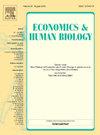Adolescent girls’ empowerment policy, health awareness, and decision-making: Evidence from the SABLA program in India
IF 1.8
3区 医学
Q2 ECONOMICS
引用次数: 0
Abstract
In India, adolescent girls are highly vulnerable, facing risks that hinder their healthy development into young women. India’s Rajiv Gandhi Scheme for Empowerment of Adolescent Girls (SABLA) aims to address these challenges by promoting health awareness and encouraging decision-making autonomy, fostering women’s development. Using data from the nationally representative India Demographic and Health Survey (IDHS) and exploiting exogenous variations in the program’s rollout across districts and birth cohorts, we provide evidence that exposure to SABLA increases the likelihood of young female participants using family planning and modern family planning methods. Furthermore, it indicates that participants are more likely to adopt a healthier diet, characterized by increased consumption of green leafy vegetables and reduced intake of fried foods. Additionally, the program empowers participants to have control over their financial resources. The findings also reveal a significant reduction in the likelihood of anemia among women who were exposed to the program. Notably, our results suggest that SABLA contributes to delaying women’s marriage and their first childbirth. We find that women exposed to the program have fewer children than their counterparts and face fewer pregnancy losses. To account for COVID-19 disruptions, we include a COVID dummy variable. While the pandemic affected family planning, nutrition, and anemia, SABLA’s positive impact on health and empowerment remains strong. Notably, it did not affect women’s role in household decision-making, highlighting its lasting effect on empowerment.
少女赋权政策、健康意识和决策:印度 SABLA 计划的证据。
在印度,少女非常脆弱,面临着阻碍她们健康成长为年轻女性的风险。印度的拉吉夫·甘地少女赋权计划(SABLA)旨在通过提高保健意识和鼓励决策自主、促进妇女发展来应对这些挑战。利用具有全国代表性的印度人口与健康调查(IDHS)的数据,并利用该计划在各地区和出生队列中推出的外生变化,我们提供了证据,表明接触SABLA增加了年轻女性参与者使用计划生育和现代计划生育方法的可能性。此外,它表明参与者更有可能采取更健康的饮食,其特点是增加绿叶蔬菜的消费,减少油炸食品的摄入。此外,该计划使参与者能够控制自己的财务资源。研究结果还显示,参与该计划的妇女患贫血的可能性显著降低。值得注意的是,我们的研究结果表明,SABLA有助于推迟妇女结婚和第一次生育。我们发现,参与该计划的妇女比她们的同行生的孩子少,面临的流产也更少。为了解释COVID-19的中断,我们包含了一个COVID虚拟变量。虽然大流行病影响到计划生育、营养和贫血,但艾滋病对健康和增强权能的积极影响仍然很大。值得注意的是,它没有影响妇女在家庭决策中的作用,突出了其对赋权的持久影响。
本文章由计算机程序翻译,如有差异,请以英文原文为准。
求助全文
约1分钟内获得全文
求助全文
来源期刊

Economics & Human Biology
医学-公共卫生、环境卫生与职业卫生
CiteScore
4.50
自引率
12.00%
发文量
85
审稿时长
61 days
期刊介绍:
Economics and Human Biology is devoted to the exploration of the effect of socio-economic processes on human beings as biological organisms. Research covered in this (quarterly) interdisciplinary journal is not bound by temporal or geographic limitations.
 求助内容:
求助内容: 应助结果提醒方式:
应助结果提醒方式:


